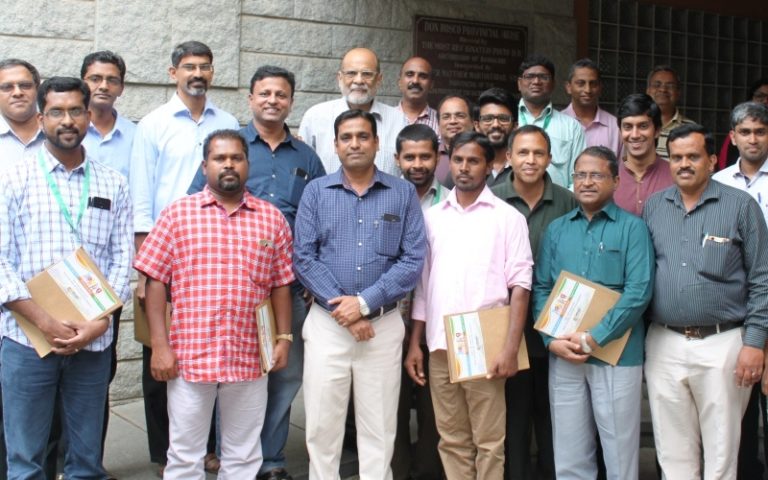Environment and ecology, the two concepts being embraced and high on agenda at the present time among the vast majority of people. The increasing frequency and intensity of natural calamities/disasters regionally and globally are the warning signs to pay attention to the cause. The time to resume from the pause of thoughts has crossed and it’s the time to evolve and act as environmentally responsible citizens. In this perspective, BREADS has organized the two day workshop on waste management, vermi composting and organic farming. In aligning itself with the objectives of Don Bosco Green Alliance, BREADS has decided to be proactive in the decisions regarding environmental issues to contribute in every possible way.
The two day training on waste management, vermi composting and organic farming was organized on 7 and 8 August, 2018 at Don Bosco Provincial House, Bangalore. The training began with the inauguration ceremony which was delighted by the presence of Fr. Joyce Thonikuzhiyil, Provincial, Bangalore province, Fr. M.K George, the Rector, Fr. Joy Nedumparambil, Executive Director BREADS and Dr. Sultan Ahmed Ismail, Director, Ecoscience Research Foundation, Chennai. The participants included Salesians from various Don Bosco Institutions since their involvement will help in practical implication of the knowledge at bottom level and other representatives closely working in connection with environmental causes. After the inauguration, the first session was taken over by Dr. Sultan Ahmed Ismail. He innovatively explained the major difference between restoration and rehabilitation with regard to environmental issues and the fact that ecology cannot be restored once lost. The clash of ecology with economy was another point discussed and the training included the various interlinked consequences when an imbalance is created in the eco system. There is a great invisible interaction; relationship happens between plants and animals in the environment, the disturbance created in the habitat of one species could eventually lead to the destruction and extinction of the other species or animals. The erosion of the top layer soil and dissolvement of excess Nitrate content in water has destructive impact on every living being, especially studies shows children experience stomach cramps due to the consumption of nitrate dissolved water.
Waste management being the priority of time, the concept was beautifully coined as resource management. It was said that the first successful step in resource management is the reduction in waste production. The development of technology has contributed much to economy but unfortunately has eliminated the hidden potentials of traditional wisdom in maintaining the equilibrium of environment. The most interesting part of the training was being able to convince the participants that the scientific knowledge is not colliding with indigenous knowledge if the objective is not contradicting. The extreme importance of earthworm in formation and maintenance of soil fertility, vermi composting methods and the effective measures of organic farming were incorporated in the training. The training clearly reflected the experience, knowledge and wisdom acquainted by the resource person through his passionate and efficient work experience in the past.
The second day was utilized for demonstration and preparation of organic compost, liquid foliar sprays (farmers effective microorganisms, Gunapaselam, Panjagavya), organic pest repellents, vermicomposting, seed treatment and pest control for root grubs (ginger garlic solution). The practical orientation supported the insights gained through the oral training on organic farming. The interactive session kept the interest of the participants high. The resource person kept the session interesting by interactions and real-life experience sharing especially with his involvement with farmers.
The last session on the second day was graciously allowed for the participants to share their experience in organic farming and their great contribution towards resource management at their respective Don Bosco Institutions, Fr. Shibu, Administrator, Don Bosco Angadikadavu, Fr. Joby, Director, FCDP, Fr. Sojan, Don Bosco Sultan Bathery, Fr. John Peter, Director, Don Bosco Agro Rural Development Services, Mr. Macson, Coordinator, Don Bosco Green Alliance shared their innovative approaches. On the whole the training was very practical and efficient and the knowledge shared will turn into action with intense passion and interest.





